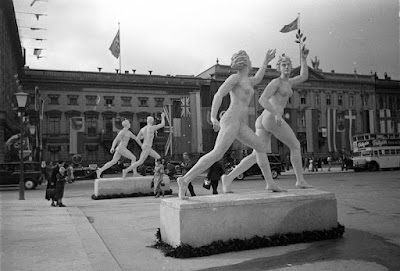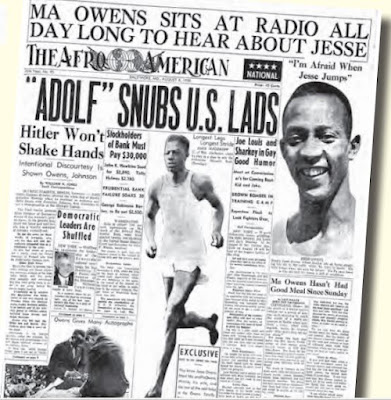Four-time Olympic gold medal winner Jesse Owens was born on this day in 1913. Now, winning all that precious metal would have been quite an achievement under any circumstance, but it's where and when the track-and-field athlete won all that precious metal that makes it particularly noteworthy:
Above is the official poster of the Games of the XI Olympiad, but as with anything official, it doesn't tell the whole...
...story.
So, what in the world was the International Olympic Committee thinking when it chose that regime to host the games? Well, that wasn't quite what was chosen. Berlin won its bid in 1931, at which time the nation as large wasn't Nazi Germany but what's now referred to as the Weimar Republic, and I guess the IOC assumed it would still be a republic five years later. It probably would have had there not been a worldwide depression that hit the Deutschland particularly hard, creating an opportunity for Hitler and his team of martinets to goosestep up to the plate as the Weimar players were booed out of the game. Once the antidemocratic and anti-Semitic nature of the new regime became apparent to the rest of the world, there was much talk within the IOC and outside as well about taking the games away from the Germans, with some civil libertarians and social justice advocates calling on their governments to boycott the games were they to go ahead as scheduled. Well, the games did go ahead as scheduled, while a boycott did not, and most countries sent their best athletes, including the United States, which sent, among others, Jesse Owens.
Owens earned his first Gold Medal on August 3 in the 100-meter dash:
On August 4, a second Gold for the long jump:
Nice to hear "U-S-A! U-S-A!" as sounding like something other than a racist rant. Indeed, anything but.
On August 5, Owens won the 200-meter sprint:
On August 9, Owens won his fourth and final Gold in the relay:
Track and field is hardly the be-all and the end-all in the Olympics. There were lots of other events, and lots of other winners, but you can't win four medals and not be the guy that everybody is talking about...
...and everybody was talking about Jesse.
It wasn't supposed to be this way--according to the Nazis.
Adolf Hitler had nothing to do with Berlin getting the Olympics, but once they were gotten and he was in charge, he ran with it, regarding the Games as a kind of...
...geopolitical, ethnographic track and field event, a way of promoting Aryan supremacy. Winning medals was merely a prelude to winning wars.
And Germany did win a lot of medals in that Olympics. 101 medals, the most of any country. The United States was a distant second at 57. But it was which Americans that won those medals that put the lie to Nazi boasts. Jesse Owens obviously was not Aryan. With the exception of Luz Long in the long jump, Owens toughest competitors weren't German athletes, but his fellow African Americans, such as Mack Robinson, Jackie's brother. None of it seemed to matter to Hitler, who instead showered his affections on the German athletes.
This led to the decades-long charge that Der Führer had snubbed the rest of the world's athletes, in particular the United States athletes, in particular the United States black athletes, in particular Jesse Owens. That's how much of the American press, particularly the black American press, portrayed it. But not everyone bought into that scenario. Surprisingly, one such dissenter was a black American member of the press himself, Robert Lee Vann, publisher and editor of the Pittsburgh Courier. "Wonder of wonders, I saw Herr Adolf Hitler salute this lad," Vann reported. "I saw Jesse Owens greeted by the Grand Chancellor of this country as a brilliant sun peeped out through the clouds" Owens himself acknowledged some sort of amiable exchange, stating, "Hitler had a certain time to come to the stadium and a certain time to leave...It happened that he had to leave before the victory celebration. But before he left I was on my way to a broadcast and passed his box. He waved at me and I waved back." This friendly exchange either wasn't caught on camera, or if it was then ended up on Leni Riefenstahl's cutting room floor. Since it's a story that Owens stuck to through the years, I have to believe it happened. Regardless of whether it was a salute or a wave or a nod or a smile or even a wink, does that make Hitler a nice guy after all? I think not. A friendly wave hardly mitigates genocide! So why did Vann and in particular Owens seem to be shilling for the racist of all racists? I don't think they were. They merely were trying to put the whole thing is perspective. And just what was that perspective?
In hindsight, an unfair comparison. But in 1936, Hitler's fiercest critics had no idea just how bad things were going to get. Prewar Germany may have been discriminatory, but it was not yet murderous. And so at the time one could make a reasonable argument that something similar to the Third Reich existed in America below the Mason-Dixon line. And traces could be found above the Mason-Dixon line as well. Upon returning to the United States after the Olympics, Jesse Owen was treated to a ticker-tape parade through Manhattan. Afterwards, there was a reception for him at the Waldorf Astoria Hotel. Except as a black, even a famous black, he wasn't allowed through the hotel's front doors. Instead, the guest of honor had to go around back and take a freight elevator to his own party! Depending on the jurisdiction, the gold medalist still had to ride in the back of the bus, still had to use a separate drinking fountain. It was those kinds of snubs on his native soil that he put up with for decades to come."Hitler didn't shake my hand, but then neither did President Roosevelt," Owens, a Republican, once said. (At the time the South was a significant source of votes for the Democratic Party. My, how things change!)
Jesse Owens post-Olympics years had their ups and down. Naturally, some of those downs had to with racism, but not all. Athletics is a time-sensitive occupation, and a pensionless retirement can come early. Owens tried to brace himself against such a future by taking money wherever and whenever he could almost immediately upon winning his medals, at first in the form of endorsements. The U.S. Olympic Committee saw that as crass and revoked his amateur status. That freed Owens up to compete professionally, but against who? Unlike soccer or basketball, there's really not much in the way of professional track and field. Owens ended up racing, and beating, a horse at the South Idaho State Fair. He also raced dogs, trucks, and motorcycles. As time passed and endorsements became fewer, Owens opened up his own drive-thu dry cleaner, which didn't last long. Various other failed business ventures eventually led him to declared bankruptcy. So much for the downs. As for the ups, President Eisenhower appointed him a goodwill ambassador, and he was sent to the developing countries of the world to promote both physical fitness and, as this was during the Cold War, the American cause of freedom. There were corporate speeches, and honors such as the Presidental Medal of Freedom, given to him by Jerry Ford. Not to be outdone, Ford's successor, Jimmy Carter, gave him a Living Legends Award. Owens was inducted into the Alabama Sports Hall of Fame. He didn't live to see it erected, but here in Cleveland, where Owens went to high school, his statue crosses a finish line in a downtown park. Ohio State, where Owens went to college, has a stadium named after him. One thing Owens did live to see was a new generation of U.S. Olympic Committee members who refused to hold his earlier commercialism against him, and even appointed him to its Board of Directors. Owens went to the 1972 Munich Olympics as a guest of the West German government, where he met the ex-boxer Max Schmeling, who had battled Joe Louis in another African American-versus-the-Nazis sporting event (though Schmeling was anything but a Nazi and in fact harbored Jews during World War II.) A pack-a-day smoker, Jesse Owens died of lung cancer in 1980.
Whoopie Goldberg got herself embroiled in a bit of controversy not too long ago when she characterized the Holocaust as "white-on-white violence", refusing to regard Judaism as a race. Well, is it? That depends on who's doing the regarding. Some 20 years ago, biologists came to the conclusion that, genetically, there was no other race but a human race and the various groupings that we regard as separate races are not distinct species of hominoids but mere social constructs. Well, for Goldberg and plenty of others who are neither geneticists nor biologists, skin pigmentation has long been the tried-and-true way of constructing those social differences. Except under that definition, Adolf Hitler was oddly colorblind. Race was whatever the Powers That Be said it was, anti-Semitism a government-mandated dye job that became a social, as well as a damn near literal, deconstruction of a whole people.
Mel Brooks once defended the many Nazi jokes found in both the movie and stage versions of The Producers by saying that he hoped such mockery would loosen whatever grip those monsters still held on the public's imagination. That came to my mind as I watched the following interview Jesse Owens did for Canadian television in 1963. By that time it had become obvious that the Third Reich had outdone even the Jim Crow South when it came to man's inhumanity to man, and Owens had adjusted his views accordingly. Actually, most of this interview concerns Owens work with the Illinois Youth Commision. However, right toward the end, the inevitable question about the Nazi Olympics is asked, and Owens comes up with a corker of a response:














.jpg)






.jpg)
While I knew about pre war and Owen's experience and achievements, and the controversial (I can't spell her name) photographer, I didn't know about Owen's post Berlin Olympic life.
ReplyDeleteVery interesting and a terrific post, but so sad that he had to use back doors to attend celebrations in his honour.
Oh, Andrew, so many blacks, no matter how famous, had to put up with that kind of crap. For instance, Hattie McDaniel won an Oscar, the first black woman to do so, for her role as the (stereotypical) housekeeper in Gone with the Wind. The hotel where the ceremony was held didn't allow blacks but made an exception in McDaniel's case. How nice of them. Except McDaniel wasn't allowed to sit at the same table with her white co-stars but was relegated to a table way in the back of the room, by the kitchen! Afterwards, the whole GWTW went to an after-awards party held at a swanky nightclub. McDaniel was going to join them but was turned away at the door, despite just having won an Oscar!
DeleteI still get tears in my eyes when I see film of Jesse Owens. I still get a chill up my spine when I see film of Adolf Hitler. Ironic that Owens was paid to advertise cigarettes. How to win at track and field.
ReplyDeleteMitchell, Owen didn't start smoking until he was 32, when his track and field days were mostly behind him. I don't think he could have won all those medals with a hacking cough.
Delete"Hitler didn't shake my hand, but then neither did President Roosevelt" -- that says it all!
ReplyDeleteThis comment has been removed by the author.
DeleteIronically, Debra, the 1930s was the decade when blacks gradually switched over from the Party of Lincoln to the Party of Jefferson Davis, mainly because they benefited from the New Deal. Still, it wasn't until after World War II that the Democrats--Northern Democrats--began taking up civil rights as a cause. These days, African-Americans are the party's most loyal constituency. And if you see someone waving a Confederate flag, chances are that person's a Republican.
DeleteHello Kirk, I had not realized that Owens was so well-spoken. Maybe the Nazis were the ones who started giving him cigarettes in order to destroy his stamina. After reading about Owens' often regrettable reception in the U.S., it is chilling to think that some of the worst civil rights outrages came considerably later, and well within living memory.
ReplyDelete--Jim
Jim, both cigarettes and Nazis can be hazardous to your health.
Delete